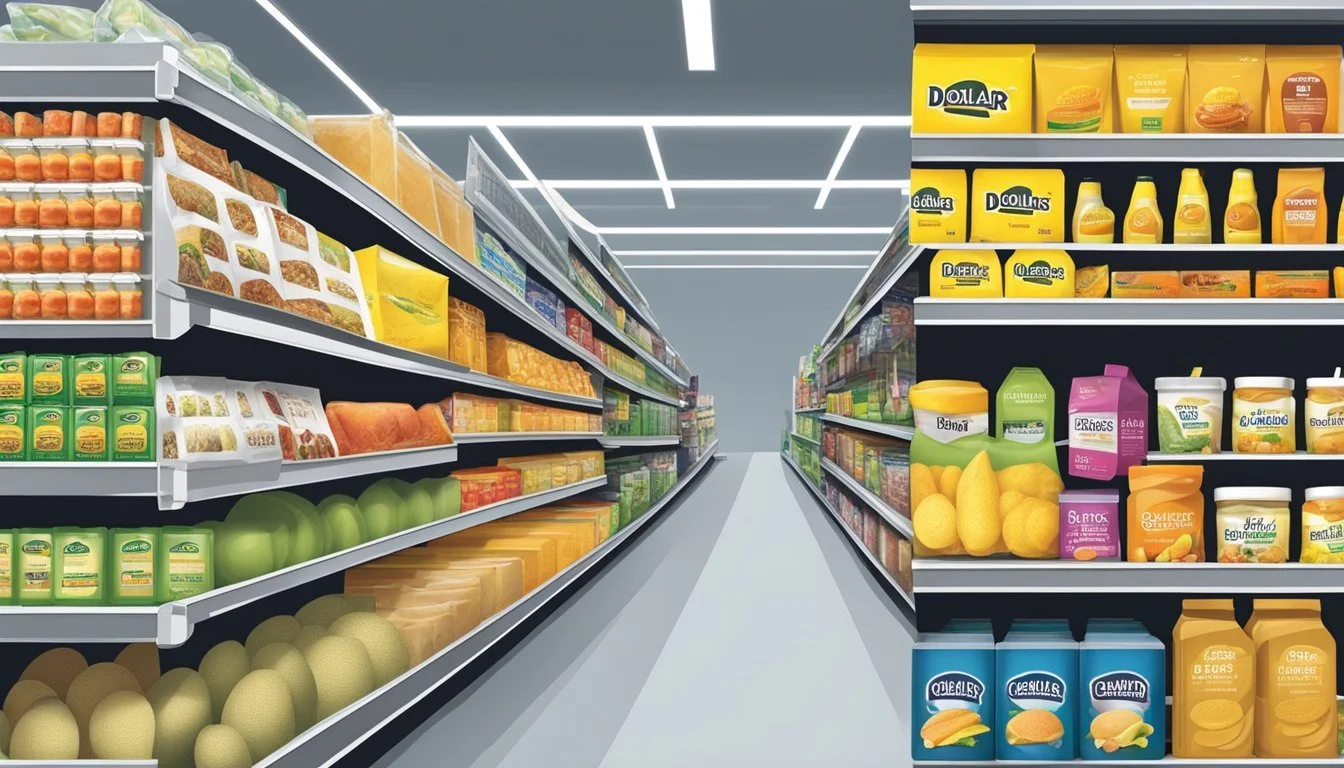Dollar General vs Food Lion
A Comprehensive Comparison of Prices, Quality, and Selection
Choosing the right grocery store can significantly impact your budget and shopping experience. Dollar General and Food Lion are two popular options that cater to different consumer needs. While both aim to provide affordable groceries, they have distinct approaches to pricing, product selection, and store formats.
Walmart tends to offer the best overall value among major grocery chains, with lower prices than both Dollar General and Food Lion. However, the comparison between Dollar General and Food Lion is more nuanced. Dollar General focuses on convenience and smaller format stores, often in rural areas, while Food Lion operates larger supermarkets with a wider selection of fresh produce and name-brand items.
When deciding between Dollar General and Food Lion, shoppers should consider factors beyond just price. These include store locations, product variety, quality of fresh foods, and available discounts or loyalty programs. The best choice ultimately depends on individual preferences, shopping habits, and specific local store offerings.
Background of Dollar General and Food Lion
Dollar General and Food Lion are prominent players in the American retail landscape, each with distinct histories and approaches to serving customers. These companies have shaped local economies and shopping habits across the United States.
Company Histories
Dollar General's roots trace back to 1939 when J.L. Turner and his son Cal opened J.L. Turner and Son Wholesale in Scottsville, Kentucky. The company rebranded as Dollar General in 1955, focusing on no-frills stores with low-priced goods.
Food Lion began in 1957 as Food Town when Ralph Ketner, Brown Ketner, and Wilson Smith opened a grocery store in Salisbury, North Carolina. The chain adopted the Food Lion name in 1983 to facilitate expansion.
Both companies experienced significant growth in subsequent decades. Dollar General expanded rapidly, particularly in rural areas, while Food Lion established a strong presence in the southeastern United States.
Business Models
Dollar General operates as a discount retailer, offering a variety of merchandise at low prices. Their inventory includes household essentials, packaged foods, cleaning supplies, and basic apparel. The company's strategy revolves around small-format stores in convenient locations.
Food Lion follows a traditional supermarket model with a focus on fresh produce, meats, and grocery items. They emphasize value through competitive pricing and frequent promotions. Food Lion stores typically offer a wider range of products and brands compared to Dollar General.
Key differences:
Store size: Dollar General (smaller) vs Food Lion (larger)
Product range: Dollar General (limited) vs Food Lion (extensive)
Fresh food offerings: Dollar General (minimal) vs Food Lion (substantial)
Market Presence
Dollar General has achieved extensive national coverage with over 17,000 stores across 46 states. The company's expansion strategy targets rural and suburban areas, often in communities with limited retail options.
Food Lion maintains a more regional focus, operating approximately 1,100 stores in 10 southeastern and mid-Atlantic states. Their market presence is particularly strong in North Carolina, Virginia, and surrounding areas.
Dollar General's widespread presence has led to concerns about its impact on local grocery stores. In some areas, Dollar General stores have become primary shopping destinations, especially in regions classified as food deserts.
Food Lion continues to compete with other major supermarket chains and has implemented various initiatives to enhance customer experience and maintain market share in its operating regions.
Store Layout and Shopping Experience
Dollar General and Food Lion offer distinct shopping environments tailored to their target customers. The layout, design, and service at each store significantly impact the overall experience.
Navigation and Design
Dollar General stores typically feature a compact layout with narrow aisles. Products are organized in a no-frills manner, often stacked in boxes or on simple shelving. The design focuses on efficiency and value, with clearly marked sections for household goods, groceries, and personal care items.
Food Lion stores tend to be larger, with wider aisles and a more traditional grocery store layout. Fresh produce is often prominently displayed near the entrance. Departments are clearly labeled, making navigation easier for shoppers. The stores generally have a brighter, more open feel compared to Dollar General.
Checkout Efficiency
Dollar General aims for quick transactions. Stores usually have a limited number of checkout lanes, often with self-checkout options available. This can lead to faster service during off-peak hours but potential lines during busy periods.
Food Lion typically offers more checkout lanes, including express options for customers with fewer items. Self-checkout kiosks are available in many locations. The chain has invested in technology to speed up the checkout process, including mobile payment options.
Customer Service
Dollar General's approach to customer service is straightforward. Staff members are trained to be efficient and helpful, focusing on basic assistance and quick problem-solving. The emphasis is on a no-frills shopping experience.
Food Lion places a higher priority on customer engagement. Employees are often more visible throughout the store, ready to assist with product location or questions. Many Food Lion stores offer additional services like in-store pharmacies and customer service desks for more complex inquiries or returns.
Product Selection and Quality
Dollar General and Food Lion offer distinct product ranges and quality levels to cater to different customer needs. Their selections vary across fresh produce, meats, dairy, and packaged goods.
Fresh Produce
Dollar General's produce section is limited, focusing on basic fruits and vegetables. Apples, bananas, potatoes, and onions are typically available. Quality can be inconsistent due to less frequent restocking.
Food Lion provides a wider variety of fresh produce. Shoppers can find seasonal fruits, leafy greens, and organic options. The chain emphasizes local sourcing when possible, which can lead to fresher items. Food Lion's produce generally maintains better quality due to more frequent restocking and dedicated produce staff.
Meat and Dairy
Dollar General offers a small selection of frozen meats and basic dairy items. Milk, eggs, and cheese are usually available. The focus is on long shelf-life products rather than fresh cuts.
Food Lion features a full-service meat department with fresh cuts, poultry, and seafood. Their dairy section is more extensive, including various milk types, yogurts, and specialty cheeses. Food Lion's meat and dairy quality tends to be higher, with more premium and organic options available.
Packaged Foods and Pantry Items
Dollar General excels in shelf-stable packaged foods. Their aisles are stocked with canned goods, snacks, and basic pantry staples. The chain offers a mix of name brands and their own private label products at competitive prices.
Food Lion provides a broader range of packaged foods, including more gourmet and health-focused options. Their store brand, "Food Lion", covers many product categories with quality comparable to national brands. Food Lion also carries a wider variety of international foods and specialty diet items.
Pricing Strategies and Affordability
Dollar General and Food Lion employ distinct pricing approaches to attract budget-conscious shoppers. Both chains aim to provide affordable options, but their strategies differ in key ways.
Comparison of Prices
Dollar General focuses on maintaining low prices across its inventory. Many items are priced at $1 or less, making it attractive for basic household goods and pantry staples. Food Lion, on the other hand, offers competitive prices on a wider range of grocery items.
A typical grocery basket at Food Lion may cost slightly less than at larger chains like Kroger. For example, a 38-item basket at Food Lion totaled $90.55 compared to $90.62 at Kroger. This marginal difference highlights Food Lion's commitment to value pricing.
Dollar General's limited selection of fresh produce and meats may result in higher prices for these items compared to Food Lion. However, Dollar General often beats Food Lion on packaged goods and non-food items.
Discounts and Savings
Both stores offer regular sales and promotions to drive customer traffic. Dollar General frequently runs "$5 off $25" coupons, encouraging larger purchases. These deals can lead to significant savings on already low-priced items.
Food Lion uses a mix of weekly specials and digital coupons. Their "MVP" card provides access to exclusive discounts and personalized offers based on shopping habits. This targeted approach helps customers save on items they frequently purchase.
Dollar General's clearance sections often feature deep discounts on overstocked or seasonal items. Food Lion typically offers more traditional grocery store sales, such as buy-one-get-one deals on popular brands.
Loyalty Programs
Food Lion's MVP program is central to its pricing strategy. Members earn points on purchases, which can be redeemed for store credit. The program also unlocks access to digital coupons and personalized offers.
Dollar General's DG Digital Coupons app provides similar benefits. Users can clip digital coupons and receive personalized offers. The app also features a cart calculator to help shoppers stay within budget.
Both loyalty programs are free to join and can lead to substantial savings. Food Lion's program tends to offer more grocery-specific rewards, while Dollar General's focuses on general merchandise discounts.
Consumer Convenience
Dollar General and Food Lion offer distinct approaches to grocery shopping convenience. Their store locations and shopping options cater to different consumer needs and preferences.
Store Locations
Dollar General focuses on serving rural and suburban areas. The company operates over 18,000 stores across 47 states, often in small towns and communities with limited retail options. Many Dollar General stores are situated in strip malls or standalone buildings, providing easy access for local residents.
Food Lion maintains a strong presence in the southeastern and mid-Atlantic regions of the United States. With approximately 1,100 stores, Food Lion typically locates its outlets in suburban and urban areas. The chain's stores are often found in shopping centers or neighborhood locations, making them convenient for regular grocery trips.
Shopping Options
Dollar General offers a streamlined shopping experience with a focus on essential items. The stores feature a limited selection of groceries, household goods, and personal care products. While not a full-service grocery store, Dollar General provides quick and easy access to everyday necessities.
Food Lion provides a more comprehensive grocery shopping experience. The chain offers a wider range of fresh produce, meats, dairy products, and pantry staples. Food Lion also features in-store bakeries and delis in many locations.
Both retailers have embraced online shopping and delivery options. Dollar General offers DG Pickup for online orders at select locations, while Food Lion provides grocery delivery through partnerships with third-party services like Instacart.
Brand Perception and Customer Loyalty
Dollar General and Food Lion have distinct brand identities that shape customer perceptions and loyalty. Both chains have experienced growth and expansion while cultivating their customer bases through different strategies.
Ratings and Reviews
Dollar General receives mixed reviews from customers. Some appreciate its low prices and convenience, while others criticize product quality and store cleanliness. The chain's focus on value attracts budget-conscious shoppers.
Food Lion garners positive feedback for its fresh produce and meat departments. Customers often praise the chain's loyalty program and weekly specials. Food Lion's Knoji score of 4.3 out of 5 from 72 ratings indicates generally favorable consumer sentiment.
Both stores face competition from larger chains like Walmart and regional players such as ALDI and Lidl.
Brand Growth and Expansion
Dollar General has aggressively expanded its footprint, now operating over 18,000 stores across 47 states. The company leverages customer data to drive growth, using insights to personalize digital experiences and optimize promotions.
Food Lion maintains a strong regional presence with approximately 1,100 stores in 10 states. The chain focuses on its core Mid-Atlantic and Southeast markets, competing effectively against larger national brands.
Both retailers continue to invest in their respective niches. Dollar General targets rural and urban areas with limited grocery options, while Food Lion emphasizes its connection to local communities.
Final Verdict
Dollar General and Food Lion each have their strengths when it comes to grocery shopping. Dollar General offers convenience with its smaller stores and focus on everyday essentials at low prices. Food Lion provides a more traditional supermarket experience with a wider selection of fresh produce and name-brand items.
Price-conscious shoppers may find better deals on packaged goods and household items at Dollar General. The chain's private label products can offer significant savings compared to name brands.
Food Lion tends to have an edge when it comes to fresh produce quality and variety. Its larger produce sections typically stock a broader range of fruits and vegetables.
For weekly grocery trips, Food Lion's fuller selection makes it a more comprehensive one-stop shop. Dollar General is better suited for quick trips to grab a few items.
Food Lion's loyalty program and weekly specials can lead to good savings for regular customers. Dollar General's everyday low pricing model means less variation in prices from week to week.
The best choice ultimately depends on individual shopping needs and preferences. Budget-focused shoppers may prefer Dollar General, while those prioritizing fresh foods may lean towards Food Lion.







